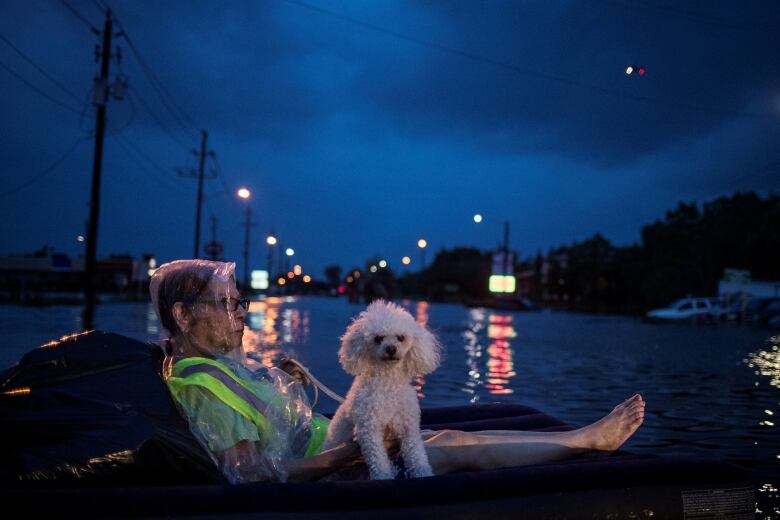Why Harvey stalled over Houston
CBC meteorologist Johanna Wagstaffe takes your questions about Hurricane Harvey
Tropical storm Harvey was still making its mark on the U.S. southeast Wednesday, with flood, wind, storm surge and tornado warnings in place days after the storm first made landfall in Texas last week.
The deadly storm, which has displaced tens of thousands and destroyed more than 1,000 homes, is now expected to track northeast, becoming a tropical depression but still releasing torrentsof rain as it moves in the direction of Kentucky.

In a Facebook Live on Wednesday afternoon, CBC meteorologist Johanna Wagstaffetook viewer questions about the track of the storm and whether the system will affect Canada.
"At this point the models do not bring Harvey up into Canada," she said. "It stalls out before then."
Blocked in place
She also took questions about the science behind Harvey, including whether the record rainfall in the U.S. could be pinned on climate change.
"It is a complicated answer, but it's one that meteorologists and storm forecasters have been thinking about a lot lately," Wagstaffe said.
"Hurricanes are naturally occurring forces of nature. They've always been difficult to predict and they've always occurred. Harvey is not a direct result of climate change, but where climate change does play a role is how devastating it ended up making Harvey."
Wagstaffe said Harvey dropped as much rain as it did in Texas because it stalled in place, blocked by a high-pressure system in the western U.S. (which has brought heat to Western Canada) and a low-pressure system to the east (which has brought stormy weather to southern Ontario).
- Tropical storm Harvey: Read more from CBC News
- Before-and-after photos capture Houston's historic flooding
- Climate change likely helped fuel Harvey's strength
- Why Houston is under water: Harvey's destruction explained
"These two systems were blocked in place, not allowing Harvey to move northward, and recent studies show these blocking patterns are a direct result of a warming climate.
"The jet stream isn't as strong, it meanders more, it gets stuck in place. That's something we're worried about when it comes to climate change, these stalled-out systems."
Another connection to climate change, Wagstaffe said, is that a warmer atmosphere can generally hold more moisture than a cooler one.
To watch the complete Facebook Live, please click the video above.













_(720p).jpg)


 OFFICIAL HD MUSIC VIDEO.jpg)
.jpg)



























































































